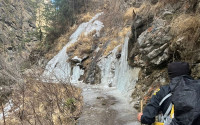National
Mayor joins Congress in accusing Oli in Giri Bandhu land scam
Balendra Shah urges UML chair to refund advance payments collected from individuals in ‘the Rs100 billion scam’.
Purushottam Poudel
On Monday, Kathmandu Metropolitan City Mayor Balendra Shah posted a status on his social media accounts targeting KP Sharma Oli, chair of CPN-UML, the major coalition partner of the Pushpa Kamal Dahal-led government.
Mayor Shah accused UML chair Oli of committing ‘policy corruption’ in connection with the illegal swapping of Giri Bandhu Tea Estate land in Jhapa.
The Oli government formed after the 2017 general elections had allowed the owners of the tea estate to swap 343.19 bigha (232.43 hectares) of land it occupied, based on a revision of the Land Act (1964).
The Act was revised in January 2020, under the Oli administration, and a provision was inserted to allow the swapping of land or selling it to pay off the tea estate’s liabilities if it went into liquidation.
“Honourable KP Oli jyu, don’t hoodwink people by engineering yet another scam to hide a scam of Rs10,000 crore [Rs100 billion],” Shah wrote. “You had reassured those who had made advance payments to buy land of Giri Bandhu Tea Estate that they would get the land within two years.”
He said that if one looks at the policy corruption in the tea estate, it appears as if “not even a single leaf would stir without Oli’s nod”. He suggested the leader return the advance payments of the people. “Otherwise, some truly new one [leader] may come and reopen the case. But then you have served a jail term in the past as well,” he wrote.
In the post, the mayor also expressed his anger over the government’s intervention in his plan to widen pavements in the Capital’s New Road area. Deputy Prime Minister Raghubir Mahaseth of Oli’s party UML leads the Ministry of Physical Infrastructure and Transport.
A few days ago, Shah was engaged in a heated debate with the chairman of KMC’s ward 22 Chinkaji Maharjan, also a UML member, over sidewalk expansion plan in the New Road area.
UML lawmaker and party secretary Yogesh Bhattarai challenged those who accused the party and party chair of being involved in policy corruption in the tea estate land to form an investigation committee and disclose the truth.
“Kathmandu is a civilised city, and the mayor of the city should behave in a civilised manner,” Bhattarai told the Post.
Mayor Shah also took a subtle dig at Deputy Prime Minister and Minister for Home Affairs Rabi Lamichhane and his party Rastriya Swatantra Party (RSP) for remaining silent on the corruption issues.
Again, if the old tea estate case was not amicably settled, Shah wrote, “Someday, a truly new political party might come in power and reopen the file [of the Giri Bandhu Tea Estate].”
The Kathmandu mayor was hinting that the RSP—which emerged as the fourth largest party in the House of Representatives from the 2022 election on the agenda of anti-corruption and good governance—is not a “truly new” party.
On the trail for the 2022 election campaign, RSP leaders, mainly its chair Lamichhane, fiercely criticised leaders of traditional political forces and sought public support to remove them from power.
However, the RSP leaders are now being accused of working in collusion with the same old parties and their leaders, especially the UML. The RSP is being blamed for supposedly trying to trade the wrongdoings of their party president, Lamichhane, with the wrongdoings of the UML.
However, leaders from the new party deny the allegations.
The party has demanded a comprehensive investigation not only into the tea estate land scam but also all the scams after the 1990 political change, an RSP leader says. The leader also argued that Mayor Shah’s strategy of questioning the RSP’s intent might be aimed at gaining some political mileage.
“Speaking in Parliament on Sunday, a joint spokesperson of our party has already demanded an investigation into all previous scams,” RSP lawmaker Sishir Khanal told the Post.
Manish Jha, the RSP joint spokesperson, had said that his party wants to investigate the land scams concerning the Balmandir (Nepal Children’s Association), Bansbari Leather and Shoe Factory, and Giri Bandhu Tea Estate, as well as the fake Bhutanese refugee scam and corruption in Teramocs (Telecommunications Traffic Monitoring and Fraud Control System) procurement.
“Despite our desire to do so, we have been unable to take action on these cases as the old parties are not ready to open these old files,” Jha said.
After the Supreme Court on May 12 issued the full text of its verdict related to the Giri Bandhu Tea Estate, a high-value land in Birtamod in Jhapa, the main opposition Congress demanded an investigation into those involved in making the land swap decision.
The Nepali Congress parliamentary party meeting on May 14 also decided to raise the issue of the tea estate in Parliament.
But, speaking in Parliament on Sunday, Congress General Secretary Gagan Thapa requested his party’s lawmakers to exercise restraint. “For the time being, let us remain silent on the issue as the Supreme Court has given a clear mandate to the government on the Giri Bandhu Tea Estate land scam. Let us see how the government implements the court’s order.”
“The Maoist Centre leaders, while they were coalition partners of the Congress, often spoke on the Giri Bandhu Tea Estate issues from the rostrum of Parliament. We will like to see how they take up the issue this time,” Thapa said.
When Prime Minister and Maoist Centre Chairman Pushpa Kamal Dahal met editors of Nepali media on August 15 last year, he was positive about investigating the tea estate land scam. But after a change in his coalition on March 4, the scenario changed. The UML has replaced Congress as the largest partner in the ruling coalition.
As the court has already nullified the revision of the Act related to the land swap of Giri Bandhu, there is no need to further investigate the matter, says the Maoist Centre lawmaker Lekh Nath Dahal. However, he did not rule out the possibility of those involved in the questionable decision facing moral questions.
“It is debatable whether the ones who decided the matter are morally responsible,” Dahal told the Post. “The matter will be investigated if there is a formal complaint, and there are no such complaints now.”
The Supreme Court on February 7 had overturned the erstwhile Oli government’s decision.
On April 26, 2021, the Oli-led government allowed the tea estate to use land holdings that exceeded a legal ceiling on such holdings.
However, the court’s constitutional bench, headed by Bishowambhar Prasad Shrestha, ruled that the Oli Cabinet’s decision contradicted Section 12 (C) of the Land Act 1964 and was immature.
The court also ruled against allowing the Jhapa-based tea estate to swap land exceeding the legal ownership ceiling in any other place within Koshi Province, highlighting the legal implications of land reforms.
The requirement to first examine the specific land’s detailed area has been upheld by the Supreme Court’s constitutional bench in the verdict’s full text. The land that is being considered for a swap ought to yield comparable value, reads the court’s final verdict.
But the tea estate is trying to swap its land in Birtamod, reportedly valued at Rs200 million per bigha [0.67 hectares], with low-price land in Prithvinagar, Jhapa.




 17.15°C Kathmandu
17.15°C Kathmandu














